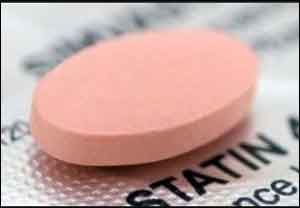- Home
- Editorial
- News
- Practice Guidelines
- Anesthesiology Guidelines
- Cancer Guidelines
- Cardiac Sciences Guidelines
- Critical Care Guidelines
- Dentistry Guidelines
- Dermatology Guidelines
- Diabetes and Endo Guidelines
- Diagnostics Guidelines
- ENT Guidelines
- Featured Practice Guidelines
- Gastroenterology Guidelines
- Geriatrics Guidelines
- Medicine Guidelines
- Nephrology Guidelines
- Neurosciences Guidelines
- Obs and Gynae Guidelines
- Ophthalmology Guidelines
- Orthopaedics Guidelines
- Paediatrics Guidelines
- Psychiatry Guidelines
- Pulmonology Guidelines
- Radiology Guidelines
- Surgery Guidelines
- Urology Guidelines
Stopping statin treatment can increase CVD risk: European Heart Journal

Paris, France: For people who are regularly taking statin therapy for high cholesterol should not stop the treatment when they are 75, recommend the researchers.
Statins, or HMG-CoA-reductase inhibitors, are cholesterol-lowering drugs widely used in both primary and secondary prevention of cardiovascular disease (CVD). Now, in a recent study, the researchers have found that older people who discontinue taking statins become more prone to CVD.
The study, published in the European Heart Journal found statin discontinuation to be associated with a 33% increase in the cardiovascular event in 75-year-old primary prevention patients.
"We would recommend not stopping statin treatment given for primary prevention of cardiovascular diseases in your patients aged 75," write the authors.
Statin use for secondary prevention of CVD has been clearly established in all age groups. However, the role of statin therapy for primary CVD prevention in subjects older than 75 years still remains debatable with little evidence to support or exclude the benefit of this treatment.
Philippe Giral, Hôpital Pitié-Salpêtrière, Assistance Publique-Hôpitaux de Paris, Paris, France, and colleagues assessed the effect of statin discontinuation on cardiovascular outcomes in previously adherent 75-year-olds treated for primary prevention.
The study included a total of 120,173 people, aged 75 between 2012 and 2014 and had been taking statins continuously for two years. Statin discontinuation was defined as three consecutive months without exposure.
Also Read: Adding Ezetimibe to Simvastatin enhances CVD risk reduction in high risk diabetes patients
Key findings of the study include:
- During an average follow-up of 2.4 years, those who stopped taking their statins had a 33 percent increased risk of being admitted to hospital with heart or blood vessel problems.
- 14.3% (17,204 people) stopped taking statins for at least three consecutive months, and 4.5 percent (5,396 people) were admitted to hospital for a cardiovascular problem.
- There was a 46 percent increased risk of a coronary event, while the increased risk of a blood vessel problem, such as stroke, was 26 percent.
- The researchers found an unexpectedly low statin discontinuation rate (14.3 percent) among the people they studied, but believe this is probably due to the fact that they included only people who had been taking statins continuously for the previous two years.
Also Read: Statins under-prescribed for lowering LDL C and ASCVD risk, finds Canadian study
Co-author of the study, Professor Joel Coste said, "While we wait for results from randomized controlled trials, carefully conducted observational studies such as this can provide useful information for doctors and patients, and can contribute to establishing more precise guidelines on the use of statins for primary prevention in the elderly."
Researchers also highlighted some seasons such as other health problems, cancer, admission to hospital, or changes in daily care (such as admission to a nursing home, problems with feeding) behind quitting statins.
"Future studies, including randomized studies, are needed to confirm these findings and support updating and clarification of guidelines on the use of statins for primary prevention in the elderly," concluded the authors.

Disclaimer: This site is primarily intended for healthcare professionals. Any content/information on this website does not replace the advice of medical and/or health professionals and should not be construed as medical/diagnostic advice/endorsement or prescription. Use of this site is subject to our terms of use, privacy policy, advertisement policy. © 2020 Minerva Medical Treatment Pvt Ltd